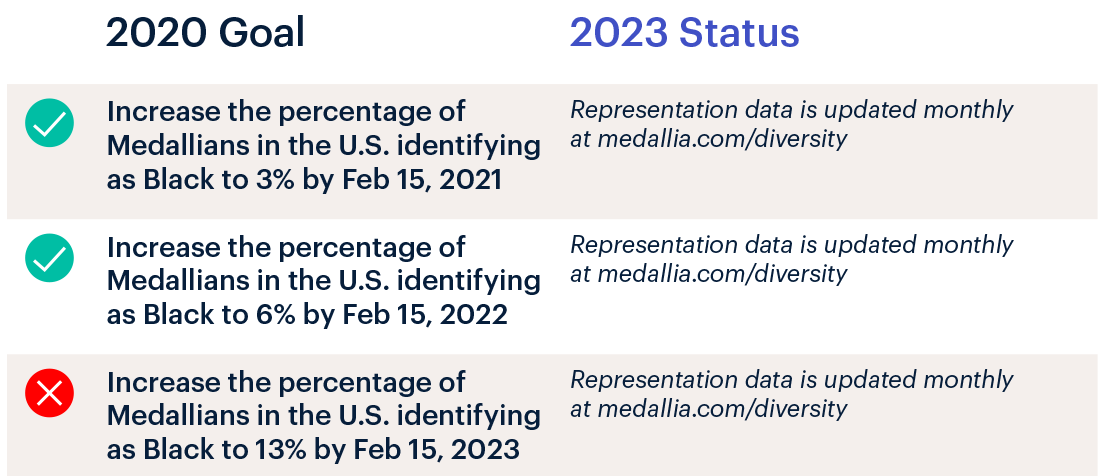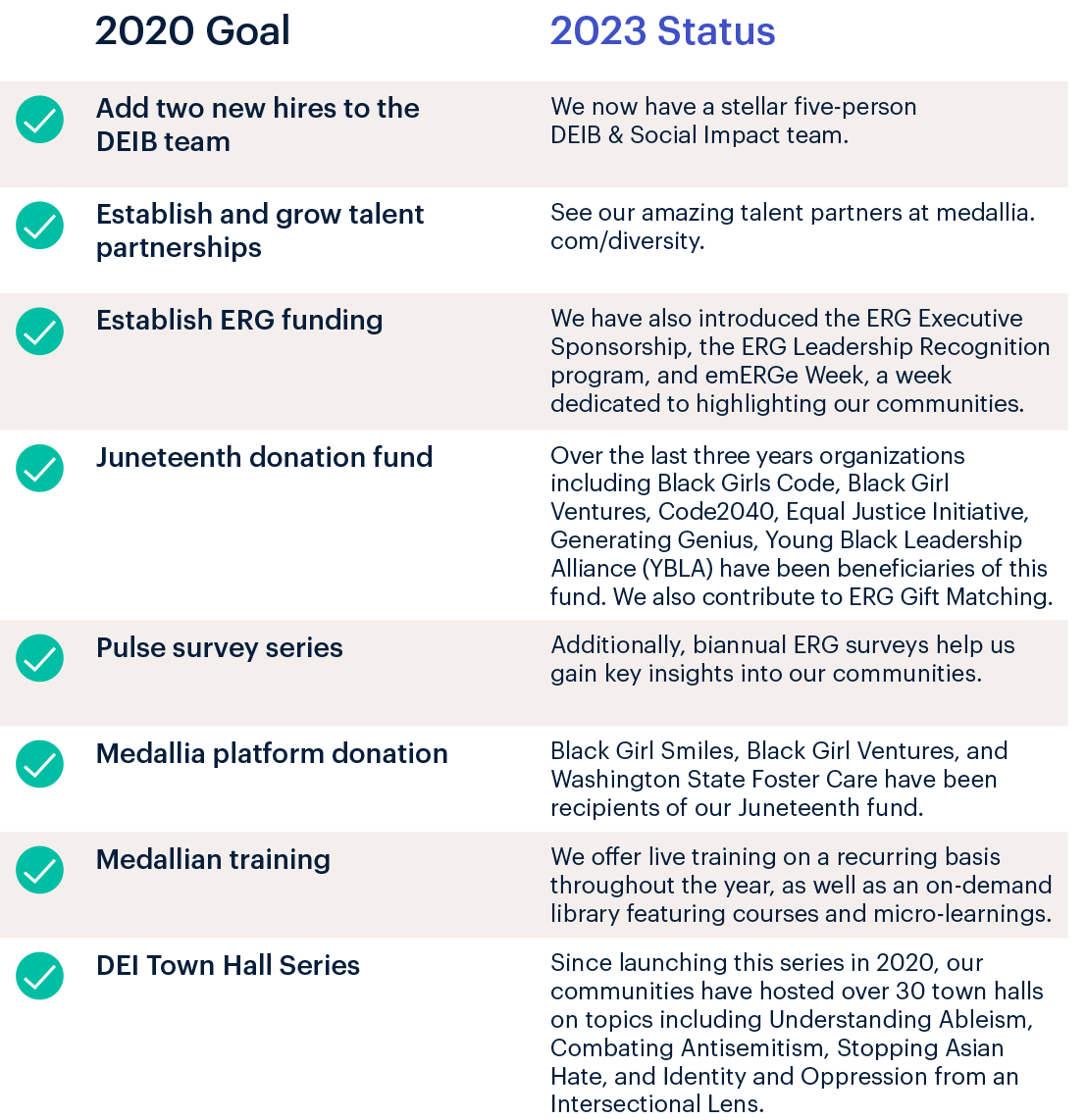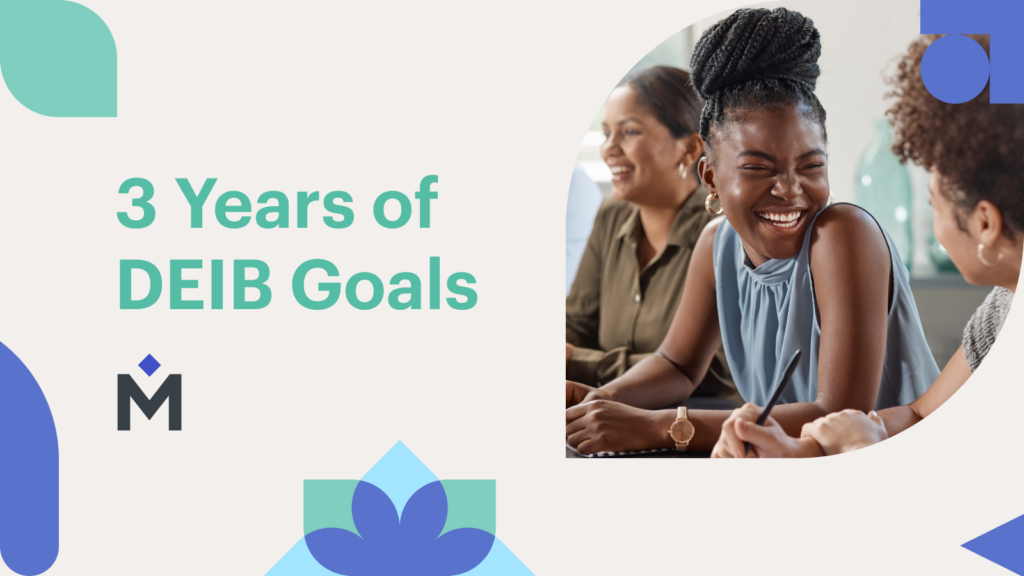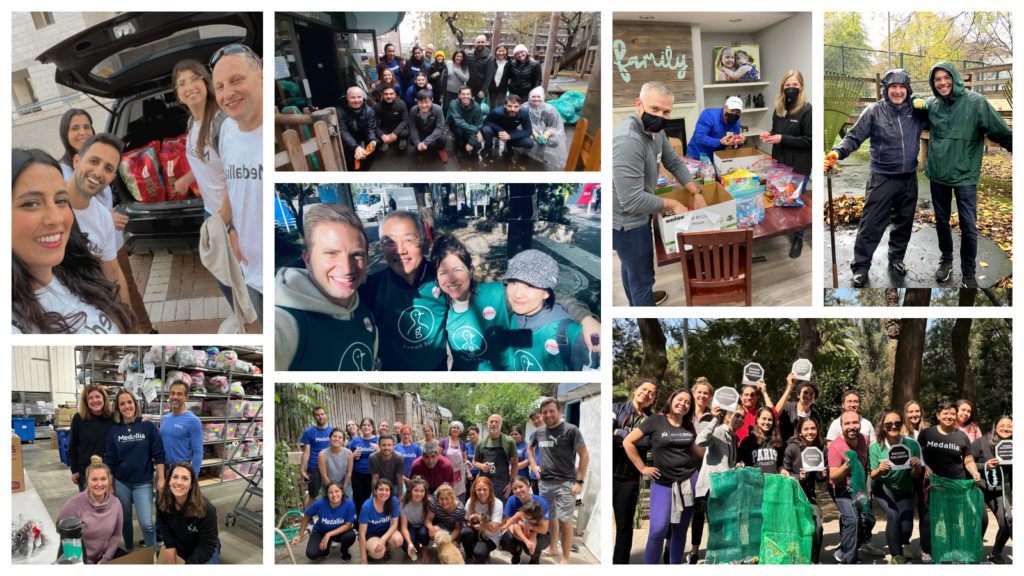When Medallia set DEIB goals, including three years of progressive representation goals, we worked hard to achieve them. We exceeded our first two goals, but missed the third. We learned a lot along the way, and we’re not giving up.
In June 2020, Medallia made a series of DEIB commitments and outlined progressive representation goals. We’ve now reached the deadline for the third of our time-bound goals, and I want to share an update on the progress we’ve made in our journey, what we’ve learned along the way, and where we’re going next.
Here’s a quick visual guide to our achievements and progress against the first part of the commitments we made:

Our Diversity, Equity, Inclusion, and Belonging Goal-Setting
Here’s the story — let’s start at the beginning. We set forth our commitments and goals in the weeks after the murder of George Floyd. Like many organizations, we were inspired to take action by the movement for racial justice that this tragedy — and too many others like it — inspired. From our couches and make-shift home offices in some of the earliest, scariest days of the pandemic, we gathered to have difficult conversations. We checked in on each other. We listened.
In some ways, we were fortunate to have a very solid foundation to start from. We already had Employee Resource Groups (ERGs), including Black at Medallia (BAM), which allowed employees to have community and a collective voice. We had an established one-person DEI team (me!) that worked to deliver programs, education, and resources. And most importantly, we had a culture of respect, a CEO and executive team who truly cared about their people, and a strong business focused on experience.
In other ways, we had an awful lot of room for improvement. We were just 1% Black. Our DEI team was under-resourced, and some employees had understandably lost faith in our commitment and effectiveness. We had work to do, so we got to it.
We set forth a series of progressive representation goals, which you can see outlined above and below. Our ultimate goal was to achieve parity with Black representation in the U.S. Census. While representation was a critical place to start, we also knew that in order to achieve this, we couldn’t focus on hiring alone. This is why we made a broad range of commitments, including growing our DEI (adding “B” for belonging) team and establishing a Juneteenth fund. We also needed to foster inclusivity across the company, which we did by investing in our ERG communities and expanding our DEIB educational offerings for all Medallians.

What We’ve Learned So Far
As you can see, we achieved our first two representation goals, and nearly all of our other goals related to increasing funding and support for DEIB in the company. The impact of our investments in education and community has been palpable. Our communities are thriving; our workforce is more inspired, better informed, and better aligned; and our leaders are embracing their role as DEIB champions.
As an organization, we’ve learned a lot, including:
- The power of the CEO to mobilize the company into action and create shared accountability for goal achievement. Having our former CEO Leslie Stretch set these goals, and tie them to executive compensation, was incredibly powerful and truly aligned the company around our goals.
- The importance of using data to chart our course. From monthly reporting on slating goals for talent acquisition to bringing a DEIB lens to our employee experience and attrition data, we saw how having discipline in this practice means you truly understand the factors that are affecting representation.
- The power of our ERG communities to bring people together and to build belonging in the organization. We saw this expand dramatically as we introduced funding for the communities with new programs like ERG Leader Recognition and ERG Executive Sponsorship, and a week focused on highlighting our communities called EmERGe Week.
Still, we’re far from finished. The biggest and most obvious miss has been our third representation goal of 13%. I won’t mince words — we didn’t come close to achieving this one, and that has been really disappointing. But it wasn’t a surprise. Our strong understanding of the key metrics affecting representation and our ability to access this data in real time has allowed us to have important discussions about why our progress stalled and what we can do about it.
There are three main factors that have affected our ability to hit the third representation goal of 13%:
- Hiring Plan: We didn’t have the hiring growth in the U.S. that we would need to hit that number. As a company grows, changing representation becomes more and more challenging, because even making a 1% change represents a larger number of people. In our last year of goal-setting, we maintained our hiring rate for Black employees, but did not have a sufficient number of new hires for this to really impact representation.
- Attrition: In our first few years of goal-setting, the majority of Black Medallians were newly hired, so we saw a very low rate of attrition among Black employees. But as the group grew in tenure, and in the midst of the Great Resignation, we saw Black attrition normalize and become more comparable to the attrition rates we see for other racial and ethnic groups.
- Acquisitions: Acquisitions are difficult to predict. The volume of acquisitions at Medallia increased over the last three years, and the companies we acquired tended to be more homogenous than Medallia.
Across all these factors, in order to increase representation, the math has to work out, and in this case, it didn’t. So we’re learning from that, and we’ll be taking that into account as we set new goals.
The Future of DEIB at Medallia
In case it’s not already clear, we are steadfast in our commitment. We will continue to push to achieve parity with the U.S. Census as our long-term goal. And we also plan to bring more focus to our management and leadership goals. We need more diversity in our leadership group, and that means making it a priority not only when it comes to talent acquisition, but also in our internal development and promotion processes.
We’ll continue to offer a lot of DEIB education and workshops, with an emphasis on supporting our global employee population with the tools they need to build an inclusive work environment. And we’ll continue to create space for authentic and honest conversations through our town hall series, our new EXP Now series Couch Talks, and community-led events.
Our goal is to make sure Medallia is a place where people can come to grow their careers, and where the decision makers are truly a reflection of the diversity that exists, in our company and in the world.









